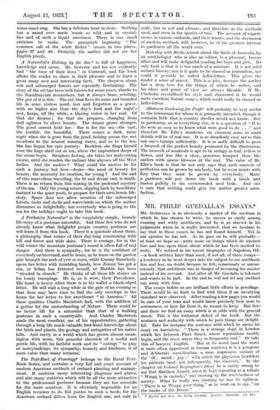MR. PHILIP GUEDALLA'S ESSAYS.*
Mu. GUEDALLA is so obviously a master of the medium in which he has chosen to write, he moves so easily among cunning and witty antitheses, and he is so shrewd in his judgments when he is really interested, that we hesitate to say that in these essays he has not found himself. Yet in our opinion he has not. As he goes on he will probably— at least we hope so—write more on things which do interest him and less upon those about which he has been invited to write. We noticed in his recent biography of Napoleon III. —a book written later than most, if not all, of these essays— a tendency as he went deeper into the subject to use antithesis less and less, no doubt because he felt, consciously or uncon- sciously, that antithesis was in danger of becoming his master instead of his servant. And after all Mr. Guedalla is tolerant and wants to be just. In the end he will not let any method run away with him.
The essays before us are brilliant little efforts in persiflage. There would be no fault to find with them if an unvarying standard were observed. After reading a few pages you would be sure of your man and would know precisely how near to seriousness, or how far from it, he meant to keep. But here and there we find an essay which is at odds with the general mood. This is the technical defect of the book. But the neatness and audacity with which he puts things are delight- ful. Take for instance the sentence with which he opens his essay on barristers. " There is a strange slope in London which lies between Fleet Street, where reputations mostly begin, and the river, where they so frequently end." Or take this of lawyers' English. " But at its worst (and the worst is more often uppermost in human matters) it is a pompous and deliberate mystification, a more impressive variant of the 0/ : menth : pip : ' with which the physician bewilders his patients (and, not infrequently, the chemist)." In the chapter on Colonel Repington's Diary he is surely wrong to say that Matthew Arnold, when he kept repeating as a refrain " Wragg is in custody," was showing up the wretchedness of society. What he really was showing up was its ugliness. " There is no Wragg, poor thing," so he went on to say, " on the banks of the Ilissus."
• Madera and Men. Ity Ybtlip Cuedalla. London : Constable. L7s. Od.1


































 Previous page
Previous page